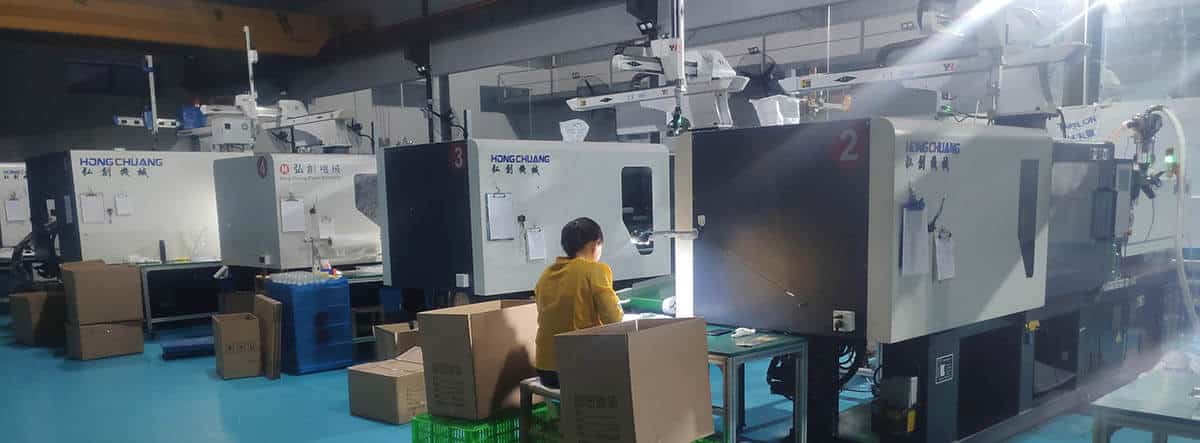automotive injection molding company
Is your company looking for a high-quality automotive injection molding company in China? We’ve got you covered! We have experienced professionals who are familiar with this industry, and can help you choose the best molding option for your needs at a reasonable cost.
You can concentrate on what really matters , when we help you bring your ideas to life quickly and efficiently. For more information about our services, please contact us today!
We offer automotive injection molding package that caters to both small and medium businesses for the entire plastics manufacturing process, making custom automotive plastics molding accessible to all.
In our plastics injection molding automotive production Package, we allow you to mold plastic automotive injection molding or mix plastic with other materials such as metal, electronic, or paper. Components and assemblies are available on request whenever possible.
















Automotive mold planning, automotive injection molding design, and mold creation are very significant aspects of Towpworks Plastic Manufacturer’s productions. For some buyers, the cost of automotive injection molds can be very high even for simple designs.
However, through our own tool shop, we reduce the development time and cost of automotive injection molding . In addition, we bundle individual mold orders to minimize costs.
If you work with us, a plastics manufacturer with extensive experience, you do not need to start from scratch.
The automotive injection molding components don’t only include elegant dashboards, seat floor mats, and other automobile plastic features that attract buyers. These options may offer an element of protection; however, hidden under-the-hood plastic auto components control a car’s overall performance and safety.
- Fascias
- Power Steering
- Tyre Pressure Sensors
- Fuel Systems
- Window and Windscreen Surround
- Radio Controls
- Suspension Mechanisms
- Engine Management Components
- Headlight Surrounds
- Bumpers
- Spoilers
- Number Plates
- Mirror Casings
- Cabling Accessories Interior Trims

How to Choose correct polymers and plastics for automotive injection molding
More than 40 kinds of basic polymers and plastics are found in cars industry. It’s not an issue considering that about 1/3 of the parts of a vehicle are plastic.
Despite many kinds of plastic material on market, however, approximately 70 percent of the material used in automotive plastic components is derived from four polymers : polypropylene (PP), polyurethane (PU), polyamide (PA) and polyvinyl chloride (PVC).1 Utilizing any one or all of them for automobile plastic design is best when done in partnership with an established injection molding supplier.
“I’m glad to inform you that all plastic parts are perfect!!! We are delighted, and therefore there are good chances to continue our relationship for any coming new project.”

CRISTIANO
ITALY
“Steven is a very detail-oriented project manager and engineer who can solve problems creatively and also provides excellent service. It was a pleasure working with him.”

DAVID
USA
The knowledge of materials and industry insight of a skilled injection molder can be invaluable. They ensure that the car’s plastic components and the vehicle systems on which they are installed comply with National Highway Traffic Safety Administration (NHTSA) standards.
Certified injection molders can select the most suitable polymers for use in cars based upon the performance requirements of manufacturing processes, as well as designs in the automotive part geometry to maximize the benefits of their products, for example:
Safety and Performance of Crash
Even with the recent developments in automobile plastic componentry, safety is the most critical factor in selecting drivetrain and engine components. Polymers have to be proved efficient in limiting the impact of vehicles and crushing and passing a variety of other automotive test criteria. That is to say: The plastics industry need keep up with technological advancements in automobile safety.
Fuel Efficiency/lightweight
In contrast to most metals, plastic is able to combine high-quality rigidity with the lightweight ability . The continuous advancement of polymers in automobiles permits OEMs to regularly replace heavy metal with light plastic elements- which offer superior performance, low specific gravity, and improved fuel efficiency. Automotive plastic components can also enhance the performance of onboard crash avoidance systems and performance systems.
Wear Resistance
Some plastics can endure extreme weather conditions, including intense UV rays from the sun and rapid temperature fluctuations, and extreme wet and dry conditions — many of which render metal a non-sensical alternative. Most plastic auto parts can take the rigors of wear and tear caused by rugged terrains.
Property Retention Over the Range of Temperature
The best plastics will keep their integrity throughout temperatures ranging from 40 degrees to 200 degrees F without compromising its quality on performance. This makes them ideal for applications that require under-the-hood protection.
Cost-effectiveness
Compared to metal, plastic component prices are usually less expensive because it is an injection molding process with faster cycle times. Additionally, color concentrates can add color to plastic parts before molding and removing the expense of painting. In addition, for assembly, one injection-molded piece eliminates the need for welded joints and fixers.
Additionally, OEMs are assuming more responsibility for sustainability by working with suppliers committed to zero- or low-waste initiatives and the use of recycled materials — goals that are not achievable with metal. Injection molders are charged with refining processes to include recycling and scrap reduction to support the circular economy and effectively control costs.
Compatibility With Mechanical Fasteners
Plastics work well with connectors and metal fasteners in the automobile assembly. They also provide the ability to bear loads with elasticity as well as high tolerances and precise molding to fit into the tight areas within larger vehicles.
The dominance of plastics in the automotive industry is a testament to the characteristics of their protections, advantages, and properties they provide. Working with an expert injection molder to determine automotive plastic design possibilities and the appropriate plastics used in automobiles increases the benefits of plastics. It decreases the automotive sector’s dependence upon metal.
If you’re in the automotive industry, chances are you’ve heard of injection molding. But what is it?

Injection molding is a process that forces high-pressure, heated melt plastic into a mold to form a solid plastic part. The result is parts with intricate details and accurate dimensions. These parts can be used in anything from automobiles to medical devices to toys. The process is used around the world and has been for decades—but did you know that China is one of the top countries for producing these parts with a reasonable cost ?
Automotive injection molding is a specialized process used to manufacture plastic parts for cars, trucks, and other vehicles. Because of its complexity, it requires a high level of technical expertise in order to ensure that the finished product is both durable and effective when designed correctly .
Automobile parts distributors looking for manufacturers of automotive injection molding parts in China. They want to buy these parts at a wholesale price and resell them their clients. They want to find a factory in China that can make these parts for a very low price. They want to buy these components directly from the factory, not through an agent.
China has become one of the world’s leading suppliers of automotive injection molding products due to its large pool of talented engineers and skilled workers, who can produce them at a low cost. However, choosing a company in China that can deliver quality parts requires careful research and consideration of several factors before making a final decision about which supplier will meet your needs best,not just the initial price they offer.
The following guide will help you choose an automotive injection molding manufacturer from China that meets your exact specifications while also providing you with high-quality products at affordable prices:
1) Price
You want to find a China automotive injection molding factory that can provide high quality parts at an affordable price. This means looking for Chinese suppliers who work directly with factories rather than through agents or middlemen. In other words, don’t just pick the first supplier you find on Google,you need check them carefully!
2) Quality
You want to make sure that any China automotive injection molding factory you choose has an established track record of producing high quality car parts for the other buyers, as well as clear documentation showing how they test each part before it leaves the factory floor. These documents can include certificates from independent labs like UL or SGS which verifythe product’s safety, as well as test reports from the factory itself.
3) Delivery
You want to make sure that any automotive injection molding supplier has a reliable delivery schedule and can deliver parts without any delay. This means avoiding China automotive injection molding suppliers who promise unrealistic delivery dates or provide little-to-no information about how long it takes for parts to be produced or shipped.It’s also important to make sure that your China automotive injection molding supplier has a reasonable lead time. If they are unable to produce parts quickly enough, you might need to look elsewhere.
4) Customer Service
Customer service is the most important ,especially for the injectionmolding industry. You should also look for suppliers that offer excellent customer service, including clear communication throughout the ordering process and with any questions you might have.If you have any questions about the quality or safety of a supplier’s products, be sure to ask them. You should also look for suppliers who provide detailed information on how their injection molded products are made and what materials they use. This will help you verify that they’re following industry guidelines while also making sure they aren’t cutting corners or using inferior materials.
